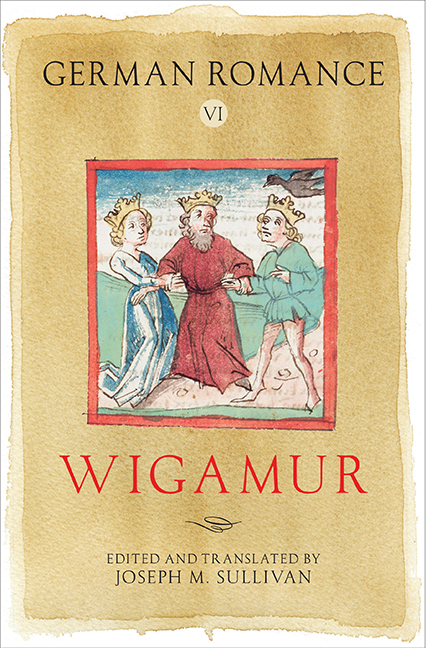Text and Translation: Conventions
Published online by Cambridge University Press: 05 June 2016
Summary
The main consideration when editing texts with relatively late manuscript transmissions, such as Wigamur, is whether to normalize their language to that of the earlier periods in which they were composed or instead to reflect as closely as possible the language, however late, of their manuscripts. While normalizing the language of even late manuscripts has a long, venerable tradition in medieval German literary studies, and although it is a practice still widely followed in editions coming out of Germany today, medieval literary studies outside of Germany have, in recent decades, increasingly got away from such normalization in favour of a more faithful reproduction of the manuscripts.
The edition included in this volume respects that more general, international trend in recent medieval literary studies. Thus it presents a conservatively critical edition of the main Wigamur manuscript, MS W, that attempts to reflect the language and orthography of MS W to the maximum extent possible while simultaneously providing a text that is accessible to both seasoned scholars and students new to medieval literary and language studies. The edition consciously avoids recreating an original Urtext for Wigamur, and takes material from the other manuscripts—the fragments MS M and MS S—only in cases where MS W is unclear or missing material (e.g. lines 10992–109993). Such material from MS S and MS M is given as it appears in those manuscripts, while other emendations to MS W—such as the addition of missing words—have been made to reflect the fifteenth-century orthography and language of MS W.
All abbreviations used in the manuscripts have been expanded silently, based on the expanded forms of these words used elsewhere in the text by the scribes. Because scribal use of abbreviations is not fully consistent, I have been guided in my expansions by unabbreviated forms appearing in close proximity to the abbreviations in question, as well as by current conventions in medieval literature studies for the expansion of such abbreviations.
The punctuation, capitalization and paragraphing of the edited text follow current English-language usage and are not intended to reflect the punctuation, capitalization and paragraphing of the manuscripts. (The main manuscript, MS W, in fact, contains no punctuation.)
- Type
- Chapter
- Information
- German Romance VI: Wigamur , pp. xxiii - xxviPublisher: Boydell & BrewerPrint publication year: 2015



